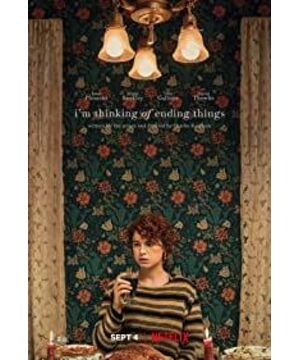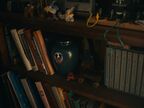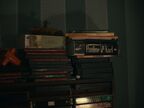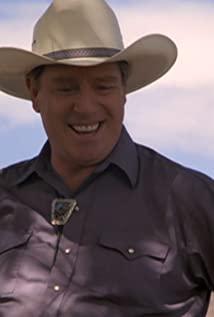-"You don't need to move on in time, maybe"
This article was first published on the public account [Gyro Movie] on September 12, 2020. Compared with the original text, this version has slightly updated and changed.
Preface
The famous American screenwriter and director Charlie Kaufman (Charlie Kaufman) launched his new film "I Want to End It All" on Netflix last Friday. This work is adapted from the novel of the same name by the Canadian writer Iain Reid, and Kaufman believes it is the last time he has directed a film.
After Kaufman completed the script of "Becoming John Malkovich" in 1999, he became famous in Hollywood with his unconstrained imagination.
Then successive creations of "Human Nature" (2001), "Adapted Screenplay" (2002), and "The Warmth with Light" (2004) all inherited his usual style- exquisite settings, complicated ideas, "no words Surprisingly endless" brain hole.
In 2008, the film "The Synonymy of New York", which he directed by himself, was at its peak, creating a world as complex as reality in dramas and movies.
Kaufman's unpredictable plot trend and emotional thickness have made him a continuous stream in Hollywood where his drama has tended to be conservative and flat for more than two decades.
For this reason, before commenting on him, I considered another way to cut into Kaufman's heart in a way that was different from ordinary film reviews, or even anti-film reviews. His highly dramatic and fragmented creation is just like what the people in the play said, it is a "grand performance with countless details... fleeting." Once obsessed with interpreting every detail one by one, we will lose the melancholy of Kaufman's implementation of the story throughout;
And if you want to refine his essence in a few words, you will lose the embellishment of the charming moment and fall into the cliché of words.
This time tailor-made for Kaufman, trying to find a balance between the two, the first thing to bear is not reconstruction, not evaluation, nor decomposition, but to reproduce his perceptual field with words and the ambiguity of imagery. And broad, come to imitate Kaufman's tricky and wild soul.
"I want to end it all"
I'm Thinking of Ending Things
Director: Charlie Kaufman
Screenwriter: Charlie Kaufman/Ian Reid
Starring: Jesse Plainmont/ Jesse Barkley/ Toni Colette/ David Huris/ Guy Boyd
Genre: Drama
Production Country/Region: United States
Language: English
Release date: 2020-08-28 (U.S. screening) / 2020-09-04 (U.S.)
Duration: 134 minutesedit/cold dog
Typography/Little Raccoon
When the screen returned to the pure snow, sitting on it was the sparse sky and the silence in the shape of a car. The morning sun is so peaceful and lonely, and there is a shadow of death geese passing by in the light.
The crowing of the birds echoed from the shrunken branches into the air in the countryside.
If the dusk of the falling snow is as dim as the death of a man, the first clear after the snow is like a dead person whose voice and smile are frozen, with eyes open to the eternal sunshine.
This is the last picture of Kaufman's new work "I Want to End It All". It is also the first time in a long time that I am still willing to stare, sit still, silence, and hold my breath without distractions after a movie is over.
I hope my life blends in this clear snow scene, and the death-like scenery stretches out in my thoughts, regardless of the end.
Tiredness, our most familiar old friend, from the beginning of "Exhausted", film history seems to be inseparable from it, and in Kaufman's hands it once again shows a fresh taste.
This time, it was attached to the window of the car, in the pigsty, full of voice mail, or the silence between crying and laughing: it seemed to be trapped in the wind and snow, and every corner of the world was covered with strange shapes overnight. Loneliness.
The story begins in the evening when winter is approaching, Jack takes his girlfriend home to meet with his parents.
On the white field all the way, they talked about the disappearing memories, the depressed poetry of their girlfriends, and the lives that had lost their desire for survival.
Walking into Jack’s childhood farm, his girlfriend seems to have stepped into a maze of time and identity. She lost her name, lost history and future, and was embarrassedly questioned at the dinner table. In the room, she saw Jack's father suffering from Alzheimer's disease, her kinky mother, a washing machine filled with the same black uniform, and a haunting dog.
Finally drove on the way home, the heavy snow still raged, Jack became anxious, irritable, and reticent. After they decided to buy two cups of ice cream from Taoxi Dessert, they took a path leading to Jack Middle School. In this empty and huge campus, his girlfriend found an old scavenger, and realized the whole story of himself and Jack—just the lonely memory of the old man before his death.
If we remember what happened in the world last winter and how we all survived, this story will no longer be as self-talking as it sounds, out of reach. When the epidemic and the cold were raging outside the window, we were huddled in the apartment, clutching our warm and mutilated limbs, and using unfamiliar local accents and people to test our dying future.
The sky was white and ill, as if everyone's pillow was also holding down a heavy snow that lasted for years. The church and the ballroom were empty together. We closed the door and put away the skirts. The small room was a difficult snowy road. Frost was full of hands, leading to the earth when it stopped.
The same cold proves that the story happened in the same time and space as us. How many warm hearts are there, or the budding future that allows us to spontaneously grasp the enthusiasm in our hands?
Neighbors maintain the appearance of love and work day after day. How much is it from true feelings, how much is it from inertia, and how long do they want to conceal each other?
If life is just a continuation of childhood, a habit as usual, or a container of information overload, then what is the difference between us and a famous saying, a walking dead parasitized by a lie, and an insect with a pre-programmed life program? These walking clichés are repeated tirelessly in the minds of playwrights, precisely because they are the tastelessness in life.
Speech and body are not interlinked, and lovers only feel noisy with each other at certain moments.
Jack gets out of the car for a cup of coffee, "Mussolini's train" interrupts his girlfriend, killing the resilience of feelings in the absurd repetition.
Only then did we recognize that embarrassment and triviality have crawled up the ankles of life like ants, and they are not clean. Once left alone, they will be itchy.
His girlfriend looked at Jack's lips in the car. He seemed to be offering some kind of invitation, but his voice was as vague as through a tree hole, and his expression was as anxious and cold as a stranger.
Such a moment is fleeting, but it seems to have glimpsed the truth of every intimate relationship through a solid disguise:
Our skins, even those of us who are blood relatives, usually make things better, but subconsciously are still hedgehogs to each other.
By the cozy stove of the farm, the roasted ham on the table comes from a pig that was gnawed by maggots on the farm; the old-fashioned and backward parents boasted about their son’s "deeds" in front of their girlfriends, and quarreled loudly when they returned to the kitchen. Jack did not add anything to them. Shame on the abruptness of temperance;
The girlfriend was called Lucy for a while, and Luisa Lucia for a while, migrating among seemingly endless names; likewise, her identity also changes with the scene, in neurology, painting, quantum physics, gerontology and Cruising between movie appreciation.
One night, she was haunted by the long river of time, and saw Jack's parents in the past, the future and after their deaths: she was domineering, he was idle, she laughed hard, he was dizzy, she lingered, he was alone.
In Jack’s room, his girlfriend saw an unfamiliar collection of poems with her own poems, a monograph on quantum physics, a film review by Pauline Kyle, and found in the basement that her own landscape paintings were actually all By Ralph Albert Blakelock: She used to think that the “words” she said in person were always just transplants of others.
The snow outside the house is getting tighter, and it seems that there is no cold that will sigh for the annihilation of a family. The girlfriend pointed to a picture of Jack on the wall, and they also found that the children in the frame were all themselves.
At the moment of electric light and flint, we have penetrated every step, every mistake, every loose screw, every impression of deviation, all from the increasingly loose memory of an old man who was left behind. He didn't know where to put his girlfriend on the timeline, and what identity he would bestow on her, because she actually never existed, just a mask he pieced together from the books he had read, the movies he had watched, and his memories.
He returned to this world in the winter, got up in the evening, put on the uniform of a scavenger, and looked at everything in the house. The young and mercury-filled girl on the stage had corpses of memories in his eyes.
In the illusion before his death, the world has turned into a pair of men and women who are in a strong relationship, and the flow of spectacles in their eyes. He saw every character left in his life being planted in unknown places, being affected by worries and fears at any time, falling into the ice cave of time.
He bid farewell to his house with a farm dinner under a yellow light, and went on the next journey in the wind and frost. Pause to see the last side of the beautiful body that I admire. They are girls performing musicals, and they only know how to sneer at him. Until another girl with a rash and a round face stretched out her hand to him, she was a rejected student in the school.
She said to the old man: "You don't need to continue walking in time, you can stay here." The implication of swallowing seemed to say, "The body that has been dried by time long ago is lost. It's time to close your eyes. Turn into memories like us."
This girlfriend who has mastered every skill that Jack has tried to learn and desires is actually the idealized object in the cleaner's dream, and Jack is also the self he projected (beautified) in this delusion. His girlfriend's pervertedness towards his parents in delusion, his origin, his falling book bag and unkindness, his "rotten toes" obediently, without complaint, is exactly the compensation for his loneliness and death in reality.
It is conceivable that, in reality, he has a big belly and has a good eye and a low hand. He has a half-hearted knowledge but does the work of a porter. His father lacks education, his mother is reckless and brainless to flatter his son, and his parents often quarrel (infiltrated into the background of the living room after a meal). Tone, the old man’s flashback in the carriage). The old man had endless dreams of beautiful love affair, so ice cream cups were piled up with trash cans one by one.
When exactly, when can all this end? A love that has no meaning and no end? And the life with "profound, unspeakable, and irreparable mistakes" referred to by this relationship?
Instead of repeating the cycle of incompetence in the eternal dying cycle of buying an ice bucket-not eating it-throwing it into a cup? Perhaps this is the only question that the voice that has been lingering on the phone wants to ask.
Renaissance humans walked from the collective ignorance of the Middle Ages with fresh vigor. There was only one problem in his bloody throat, but it was another:
"Survival or destruction?"
Four hundred years later, human beings have lost all their vitality, all the passion to fight death, a mouthful of black venous blood only hopes that life will let go of his collar earlier, earlier.
We can regard this weird, obscure, faded and embarrassing world as the invention of the empty-nest old man’s decadence-the easy conclusion not only fits the foreshadowing of Kaufman’s painstaking efforts, but also makes it convenient for us to read a strange novel in the movie. After the end, put this horrible story behind.
But... maybe there is another possibility? Why can't we regard this whole world with its own laws of "physics" as another metaphor of Kaufman's real life? Perhaps it is not that the memory of the elderly has faded and the distinction between things has been lost, but that the sound people who dominate the world are too advertised and too fond of drawing unnecessary boundaries between them?
Even with us, "Memory" likes to make jokes off guard. We think of NJ in "Yi Yi". He returned home and made a big circle, but for a moment he forgot what he was looking for. Perhaps "memory" is a hornet's nest full of errors and gaps?
Kaufman just revealed in the interview that he hopes to give this fantasy world authenticity and independence. Rather than treating this narrative as a complete fiction, it is better to see it as a parallel universe connected by clues. Because of this, his girlfriend thought about "I want to end it all" all the way, and Jack also showed a negative old attitude under the harmonious appearance: the inferiority of the cleaner in reality squeezed the edge of the dream invisibly until the girlfriend and the real The cleaners met in the corridor, they hugged, shed tears, and parted. This symbolized that he accepted the impossibility of this illusion, so the image of "Jack" was subsequently wiped out by the "scavenger" in the musical.
When talking about the unfinished "Dune", Zodorovsky said, "The reason why people live is to create souls for themselves." In humans without souls, names can slide irregularly (the heroine starts from the beginning). In the end, there is no exact name), the identity can be copied indefinitely, and "I" and anyone have become two-way interoperable roles. We seem to be full of our own complaints, but we are all hollow people with similarities.
The awkward and insincere dialogue is a direct depiction of these "textualized" hollow people. The words in their mouths are obviously not worthy of our belief. From their lower lips, the unconscious twitching of facial muscles and gloomy eyes , We read that even they themselves no longer believe that "words" come from their own mouths. Just as we can't believe that the second half of the genre narrative in "Adapted Screenplay" is true, the theatricalized and functionalized characters in the film are first of all a kind of performance art that reflects the concept of real life and is stained with allegorical colors.
For Kaufman, the object is the illusion of the subject’s self-evident existence, and the subject is another illusion that bounces back from the object. Like the city copied in the original size using the director as a model in "The Synonymy of New York," its ultimate goal is It is to illustrate the nihility of the boundary between self, others and time.
"Looking closer, everything in the world is the same, you, me, all ideas, pigs full of maggots, are the same." The cleaner was overwhelmed by loneliness, but finally compromised with the reality of his aging. He stripped off his clothes and chased the fanciful pig out of the car door. There are hundreds of millions of equally tired and selfish lives in the world, equally stung by others who are out of time, and equally soulless but still unable to embrace each other, equally becoming fuel for others and ruins of self, equally being yourself, but Far beyond oneself. The surface text of the film is about an old man who fell into delusion because of inferiority complex, and the inner mechanism is the universality of the old man.
Therefore, Kaufman’s labyrinth is not used to "burn the brain" (even if it is clear, it does not help the audience to get close to the fundamental motivation of the plot) , but a personality based on universal pessimism and self-observation. Fuzzy experience. Only when we recognize this experience, we will realize that the absurd event group is not only a gimmick waiting to be explained, but also the true texture of the dark side of interpersonality lying deep in life.
Kaufman's way of restoring this texture to life is to give his character "self-contained timeliness", that is, his characters are no longer "still in time, like the wind blowing over leaves", but are mastered and detached. "Time" itself, so "girlfriend" sees people's past, future, and after death, and also sees the same genes and the same dilemmas of all living things.
Kaufman contributed the first film in the post-new crown era that condenses this increasingly cold world and the human beings in which every soul is shrinking. There is a heavy snow in our hearts, so why not outside the window? The year 2020 has shown us the possibility of world stagnation. This may be just the tip of the iceberg of a greater crisis. International relations have re-tightened, the consumer market has shrunk again and again, and globalization has provided a backstop for stabilizing the internal circulation. We just fear the virus.
Does Kaufman mean to refer to this era? Maybe the powerlessness of the movie and the encounter in 2020 are just a phrase, but it is undeniable that from the journey on the road to the car buried in the snow, this is a "cold approaching" process, to the poster. Wearing slippers and sitting on a wooden chair at home, the female protagonist who was buried in the snow and stiffened even more arrogantly overstepped the psychological division of "outside the window-in the house". There is no longer a layer of defense to distinguish between outside the window and inside the house. Even if we do not identify ourselves as austerity individuals, our private safety zone will eventually be eroded by the ice of the times. Or maybe, every one of us is negative and uneasy. In the end, they all gather into wind and rain clouds that herald the arrival of disasters?
In the pain of double-sided consummation, Kaufman hovered on the boundary of language. Words were like loose screws, returned unlimited freedom, approaching the sliding of poetry, consciousness and dreams.
In this sense, Kaufman may be the eternal copy of "Eight and a half", and each of his scripts has a Fellini-like kaleidoscopic background. And if "Eight and a half" ends in a celebration of "me", "I Want to End All of This" ends in a subversion, a funeral for myself.
At the funeral, there were countless audiences who were as old as "I". Just like Fellini’s stage, there were every familiar face of "I". "I" proclaimed "love" in vain and thanked them for constituting who I am today. But the bitter smile of "I" can't hide from the heart: it is the award speech itself, which is copied from "Beautiful Mind", and its DVD is lying in "I"'s study like a collection of poems containing "Bone Dog" . The next musical came from "Oklahoma", which continued my uninspiring life. "I" hope the crowd applauding in the audience will accompany me as old as I am, but their old attitude is only a false makeup. They seem to be numerous, but they are just divided selves.
"I've always been a fake of myself." That's true in life, but maybe even choosing to die is still a clumsy imitation of many suicide legends? I've been stepped on countless times by humans, and now I'm going around on the muddy road, even death can't wait for the first original creation.
And Kaufman's movies, are they not similar? Tells about a schizophrenic person fighting with his own hallucinations, it is like "Beautiful Mind"; two driving in the vast snow sea, like the novel "Ice" mentioned in the movie; a dick who is distressed because she can't find her love, It's like the musical "Oklahoma."
When the screen returned to the pure snow, sitting on it was the sparse sky and the silence in the shape of a car. I buried myself, and then there was an eternal silence like the sky.
View more about I'm Thinking of Ending Things reviews











